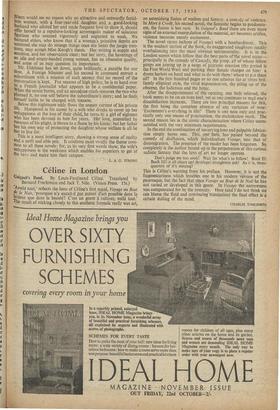Celine in London
Guignol's Band. By Louis-Ferdinand Celine. Translated by Bernard Frechtman and Jack T. Nile. (Vision Press. 15s.)
4Aeats tout,' reflects the hero of Celine's first novel, Voyage au Bout de. la Null, 'pourquoi n'y aurait-il pas autant d'art possible clans la la_Ideur que clans la beaute? C'est un genre a cultiver, voila tout.' the result of sticking closely to this aesthetic formula really was art, an astonishing fusion of realism and fantasy, a comedy of violence. In Mort a Credit, his second novel, the fantastic begins to predomin- ate, the fusion is less sure. In Guignol's Band there are even more signs of an external manipulation of the material, art becomes artifice, violence becomes merely excitement. '
The novel opens (echoes of Voyage) with a bombardment., This is the weakest section of the book, its exaggerated toughness readily overbalancing into the most obvious sentimentality. It is in the London scenes which follow that the best parts of-the novel occur— principally in the comedy of Cascade, the pimp, all of whose fellow pimps are joining up in a surge of patriotic emotion (the period is the First World War) and parking their female charges on him: a dozen harlots on hand and what to do with them' where to p..it them all? In the first hundred pages or so one admires the at times bril- liantly elliptical style, the vivid impressionism, the piling up of the obscene, the ludicrous and the bitter.
After the disappointment of the opening, one feels relieved, the book seems to be on an even keel, yet as one continues to read one's dissatisfaction increases. There are two principal reasons for this, the first being the complete absence of any variation of tone: 'Excitement's everything in life!' There is one note only and prac- tically only one means of punctuation, the exclamation mark. The second reason lies in the comic characterisation where Celine seems satisfied with the very minimum requirements.
In the end the combination of unvarying tone and palpable fabrica- tion simply bores one. This, one feels, has passed beyond the comedy of disillusion, which individualises Voyage, into that of disintegration. The presence of the reader has been forgotten. So completely is the author bound up in the perpetration of this curious sadistic fantasy that the laws of- art no longer operate.
Don't judge me too sooni Wait for what's to follow! Book Ill Book Ill! it all clears upl develops! straightens out! As it is, three- quarters of it's missing!
This is Ciline's warning from his preface. However, it is not the fragmentariness which troubles one in his modern version of the
picaresque, but the fact that since Voyage an Bout de la Null he has not varied or developed in this genre. In Voyage the narrowness was compensated for by the intensity. Here (and I do not think we can blame the fluid and convincing translation) the final effect is a certain dulling of the mind.
CHARLES TOMLINSON


































 Previous page
Previous page